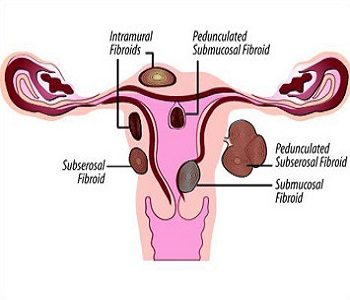Fibroid
Symptoms of fibroids
Fibroid are common tumours of the uterus (womb) found in over 20% of young women. They are rare in women under the age of 20, most common in women in their 30s and 40s, and tend to shrink after the menopause.There are firm ball like and may vary in size from pin point to very large. Fibroid are diagnosed by the history, gynecological examination and sonography.They are named according to their position in the womb and the symptoms and problems they cause, as well as their management, depend upon their location.
Although the exact cause of fibroid is unknown, they seem to be influenced by oestrogen. This would explain why they appear during a woman’s middle years (when oestrogen levels are high) and stop growing after the menopause (when oestrogen levels drop).
In the past, the contraceptive pill was thought to increase the risk of fibroids, but that was when the pill contained higher levels of oestrogen than it does today. Some studies suggest that the newer combined pill (oestrogen and progestogen) and the mini pill (progestogen only) may actually help prevent or slow the growth of fibroids.
FAQ
Q.1. I am 28 yrs. old and was diagnosed as having a large fibroid when I did a sonography recently. Are there any medicines that will treat this fibroid or do I have to undergo surgery?
Ans: Fibroids are non-cancerous tumours which if large and placed deep inside the uterus (womb) can cause heavy menstrual bleeding, pain, infertility and abortions. There is no permanent cure with medicines and removal of fibroids is the only option in a young woman like you. This can be done by Keyhole surgery (laparoscopy) in which even large fibroids can be removed through a 1-2 cm cut on the stomach (abdominal wall). If the fibroid is on the inner side of the womb, it can be shaved off with the help of a hysteroscope and this can be done without any cuts or stitches. The recovery from these surgeries is very good and hospitalization is for 1-2 days only. Some cases may require an open surgery with a 3-4 inch cut on the abdomen.
Q.2. My sister has been advised to undergo a hysterectomy. She is 42-years-old and has been suffering from severe menstural bleeding. What is the procedure involved and how risky is it? Post hysterectomy what are the medications to be taken? Are there any side effects?
Ans: What is the reason for the heavy bleeding? Does she have large fibroids or ovarian tumour etc., in which case hysterectomy may be necessary. Hysterectomy can be done either vaginally or by laproscopy ( Key Hole Surgery) or by open abdominal surgery. It is a major surgery and though quite safe, there is a slight risk of bleeding, infection or injury to the internal organs. Recovery takes a few weeks. However for heavy bleeding without any large tumours, there are now simpler, safer and quick methods for permanent treatment such as Uterine Ballon Ablation , Microwave ablation, or use of Hormonal IUCD. All of these can be done within 15 minutes, require no hospitalization and permanently cure the bleeding problem. However the suitability of each patient for a particular procedure has to be determined by the gynaecologist.
Q.3. I am 35 years old and have 2 children. Of late my periods have become very painful and heavy. I have to take 2 -3 pain killers everyday during my menses. What can the problem be and do I need to get any special tests done?
Ans: There is a chance that you may be having fibroids in the uterus. These are solid tumours which develop in the uterus (womb) and usually occur in young women. Depending on their size and location they can cause painful and heavy periods. The other common problem is that of endometriosis where blood accumulates in the ovaries or in the pelvis or adenomyosis where blood accumulates in the womb and causes it to swell in size. All these conditions can cause painful and heavy periods.
The diagnosis can be easily made by doing a pelvic sonography, and the treatment will depend on the cause. Almost always the treatment is surgical, nowadays laparoscopic (keyhole) surgery is done to treat these problems.
